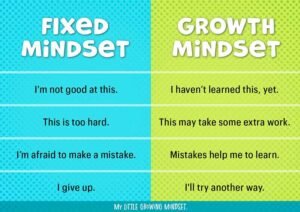Why a Growth Mindset is Key to English Success for Kids
When it comes to learning English, some kids pick it up quickly, while others struggle and start to feel like they’re just not “good at languages.” But here’s the thing—English success isn’t about natural talent. It’s about mindset. And the good news? A growth mindset can completely change the way your child learns English.
What is a Growth Mindset?
A growth mindset is the belief that abilities and intelligence can develop with effort and practice. It’s the opposite of a fixed mindset, where kids believe they are either “good” or “bad” at something and that no amount of work can change that. When kids have a growth mindset, they see challenges as opportunities, mistakes as learning moments, and effort as the key to improvement.
My Personal Journey with Growth Mindset
I didn’t really understand the concept of a growth mindset until my second year of my teaching degree. In one of my pedagogy courses, we explored different teaching strategies, and one of the most emphasised topics was the importance of fostering a growth mindset in students.
At the time, this felt like a completely new way of looking at learning challenges. I remember feeling excited as I started to understand how shifting a student’s perspective could help them push through difficulties. Once I began applying these ideas in real classrooms, I saw firsthand how students still struggled with challenges—but the way they faced them changed. Instead of shutting down or feeling defeated, they became more reflective, more persistent, and more confident that they could find solutions. They started seeing difficulties as opportunities rather than roadblocks.
That experience shaped my approach as an educator and reinforced why building a growth mindset is such a crucial part of learning—especially when it comes to mastering English.
How a Growth Mindset Helps with English Learning
Many children struggle with English not because they lack ability, but because they lack confidence. A child who thinks, “I’m bad at writing” or “I’ll never be good at speaking English” will avoid practicing and, as a result, struggle more. But a child who thinks, “I’m still learning” or “Mistakes help me improve” will keep trying and eventually grow stronger in English.
Ways to Encourage a Growth Mindset in English Learning
1. Praise Effort, Not Just Results
Instead of saying, “You’re so smart!”, try saying, “I love how hard you worked on that!” This shifts the focus from natural ability to effort, helping your child understand that improvement comes from practice.
2. Turn Mistakes into Learning Moments
If your child mispronounces a word or struggles with grammar, avoid saying, “That’s wrong.” Instead, say, “That was a good try! Let’s figure this out together.” When mistakes are seen as part of learning, kids stop being afraid to try.
3. Set Small, Achievable Goals
Big goals can feel overwhelming. Instead of saying, “Let’s improve your English this year,” break it down into smaller steps, like “This week, let’s learn five new words” or “Let’s practice speaking English for 10 minutes a day.” Small successes help kids see their progress.
4. Model a Growth Mindset
If your child hears you say, “I was never good at languages”, they might start to believe that English is something you’re either naturally good at or not. Instead, show them that learning is a lifelong journey by saying, “I’m still learning new things too!”
5. Provide a Supportive Learning Environment
Children thrive when they feel safe to make mistakes. Whether it’s at home or in an English tutoring program, a supportive teacher or parent can help them develop confidence and resilience in their learning journey. At GKEA, we focus on student-centered learning, building kids’ confidence by making English engaging, fun, and stress-free.
Final Thoughts
Success in English isn’t about being perfect—it’s about being persistent. With a growth mindset, kids become more confident, take more risks, and ultimately learn faster. If you want to support your child’s English journey, encourage them to embrace mistakes, keep trying, and believe in their ability to improve.
Looking for a learning environment that nurtures a growth mindset? Check out our student-centered English programs designed to help kids feel capable and ready to succeed!

